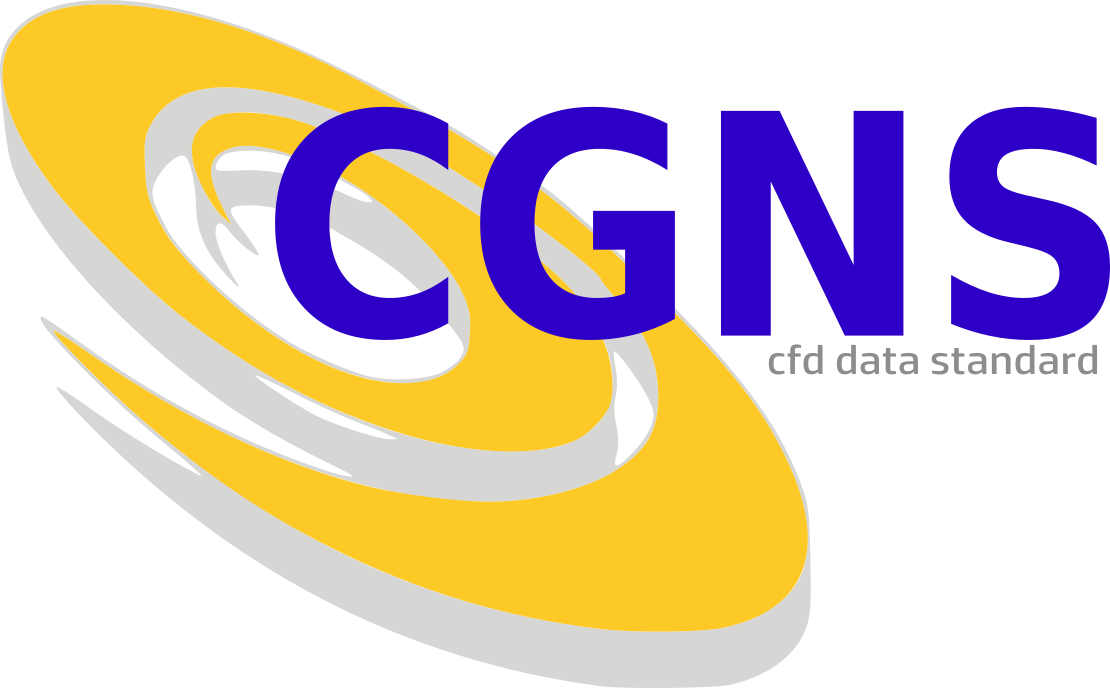
The official CGNS home page¶
The CFD General Notation System (CGNS) provides a general, portable, and extensible standard for the storage and retrieval of computational fluid dynamics (CFD) analysis data. It consists of a collection of conventions, and free and open software implementing those conventions. It is self-descriptive, machine-independent, well-documented, and administered by an international steering committee.
It is also an American Institute of Aeronautics and Astronautics (AIAA) Recommended Practice. The system consists of two parts: (1) a standard data model and mapping format for recording the data, and (2) software that reads, writes, and modifies data in that format. The format is a conceptual entity established by the documentation; the software is a physical product supplied to enable developers to access and produce data recorded in that format.
The CGNS system is designed to facilitate the exchange of data between sites and applications, and to help stabilize the archiving of aerodynamic data. The data are stored in a compact, binary format and are accessible through a complete and extensible library of functions. The API (Application Program Interface) is platform independent and can be easily implemented in C, C++, Fortran and Fortran90 applications.
Main Topics¶
Site map¶
- Introduction to CGNS
- What is CGNS?
- Quick Start Guide
- Overview
- Status and History
- Glossary
- FAQ
- General Questions
- How do I obtain CGNS?
- How can I get help if I run into problems?
- There is a lot of documentation… which are most important for me to read?
- What does SIDS mean?
- What do I do if CGNS is not capable of handling my particular application?
- When there are multiple ZONES associated with a given CGNS file, is there a particular way that they should be named?
- How do I view my CGNS files?
- How do I know if a CGNS file is correct according to the SIDS definitions?
- What do the CGNS Version numbers mean, and does the CGNS/MLL library maintain backward/forward compatibility?
- How do I keep up with the goings-on of the Steering Committee?
- Can I use the CGNS logo as part of my website or other documentation?
- Is CGNS an ISO standard?
- Installation Questions
- General Questions
- Implementations
- Standard Specification
- Standardization bodies
- CGNS/SIDS - Standard Interface Data Structures
- 1. Introduction
- 2. Design Philosophy of Standard Interface Data Structures
- 3. Conventions
- 4. Building Block Structure Definition
- 5. Data-Array Structure Definitions
- 6. Hierarchical Structures
- 7. Grid Coordinates, Elements, and Flow Solution
- 7.1. Grid Coordinates Structure Definition:
GridCoordinates_t - 7.2. Grid Coordinates Examples
- 7.3. Elements Structure Definition:
Elements_t - 7.4. Elements Examples
- 7.5. Axisymmetry Structure Definition:
Axisymmetry_t - 7.6. Rotating Coordinates Structure Definition:
RotatingCoordinates_t - 7.7. Flow Solution Structure Definition:
FlowSolution_t - 7.8. Flow Solution Example
- 7.9. Zone Subregion Structure Definition:
ZoneSubRegion_t - 7.10. Zone Subregion Examples
- 7.1. Grid Coordinates Structure Definition:
- 8. Multizone Interface Connectivity
- 8.1. Zonal Connectivity Structure Definition:
ZoneGridConnectivity_t - 8.2. 1-to-1 Interface Connectivity Structure Definition:
GridConnectivity1to1_t - 8.3. 1-to-1 Interface Connectivity Examples
- 8.4. General Interface Connectivity Structure Definition:
GridConnectivity_t - 8.5. General Interface Connectivity Examples
- 8.6. Grid Connectivity Property Structure Definition:
GridConnectivityProperty_t - 8.7. Overset Grid Holes Structure Definition:
OversetHoles_t
- 8.1. Zonal Connectivity Structure Definition:
- 9. Boundary Conditions
- 9.1. Boundary Condition Structures Overview
- 9.2. Zonal Boundary Condition Structure Definition:
ZoneBC_t - 9.3. Boundary Condition Structure Definition:
BC_t - 9.4. Boundary Condition Data Set Structure Definition:
BCDataSet_t - 9.5. Boundary Condition Data Structure Definition:
BCData_t - 9.6. Boundary Condition Property Structure Definition:
BCProperty_t - 9.7. Boundary Condition Type Structure Definition:
BCType_t - 9.8. Matching Boundary Condition Data Sets
- 9.9. Boundary Condition Specification Data
- 9.10. Boundary Condition Examples
- 10. Governing Flow Equations
- 10.1. Flow Equation Set Structure Definition:
FlowEquationSet_t - 10.2. Governing Equations Structure Definition:
GoverningEquations_t - 10.3. Model Type Structure Definition:
ModelType_t - 10.4. Thermodynamic Gas Model Structure Definition:
GasModel_t - 10.5. Molecular Viscosity Model Structure Definition:
ViscosityModel_t - 10.6. Thermal Conductivity Model Structure Definition:
ThermalConductivityModel_t - 10.7. Turbulence Structure Definitions
- 10.8. Thermal Relaxation Model Structure Definition:
ThermalRelaxationModel_t - 10.9. Chemical Kinetics Model Structure Definition:
ChemicalKineticsModel_t - 10.10. Electromagnetics Structure Definitions
- 10.11. Flow Equation Examples
- 10.1. Flow Equation Set Structure Definition:
- 11. Time-Dependent Flow
- 12. Miscellaneous Data Structures
- 12.1. Reference State Structure Definition:
ReferenceState_t - 12.2. Reference State Example
- 12.3. Convergence History Structure Definition:
ConvergenceHistory_t - 12.4. Discrete Data Structure Definition:
DiscreteData_t - 12.5. Integral Data Structure Definition:
IntegralData_t - 12.6. Family Data Structure Definition:
Family_t - 12.7. Geometry Reference Structure Definition:
GeometryReference_t - 12.8. Family Boundary Condition Structure Definition:
FamilyBC_t - 12.9. Family Boundary Condition Data Set Structure Definition:
FamilyBCDataSet_t - 12.10. User-Defined Data Structure Definition:
UserDefinedData_t - 12.11. Gravity Data Structure Definition:
Gravity_t
- 12.1. Reference State Structure Definition:
- Appendix A: Conventions for Data-Name Identifiers
- Appendix B
- CGNS/FMM - Data model mapping to implementation
- CGNS/MLL - An API for C and Fortran applications
- CGNS/CGIO - Basic node implementation
- CGNS/HDF5 - An HPC implementation
- CGNS/Python - A Python implementation
- Ressources
- News
- Documentation news
- CPEX
- CPEX0046
- CPEX0045
- CPEX0044
- CPEX0043
- CPEX0042
- CPEX0041
- CPEX0040
- CPEX0039
- CPEX0038
- CPEX0037
- CPEX0036
- CPEX0035
- CPEX0034
- CPEX0033
- CPEX0032
- CPEX0031
- CPEX0030
- CPEX0029
- CPEX0028
- CPEX0027
- CPEX0026
- CPEX0025
- CPEX0024
- CPEX0023
- CPEX0022
- CPEX0021
- CPEX0020
- CPEX0019
- CPEX0018
- CPEX0017
- CPEX0016
- CPEX0015
- CPEX0014
- CPEX0013
- CPEX0012
- CPEX0011
- CPEX0010
- CPEX0009
- CPEX0008
- CPEX0007
- CPEX0006
- CPEX0005
- CPEX0004
- CPEX0003
- CPEX0002
- CPEX0001
- Download
- Examples
- More CGNS Software
- More documentation
- CGNS Governance